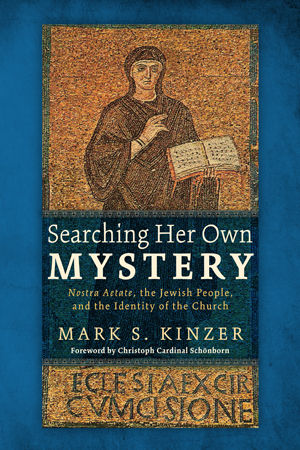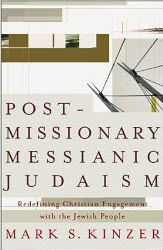
-Messianic Jewish Theologian-
Rabbi Mark S. Kinzer, Ph.D.
Stones the Builders Rejected
The Jewish Jesus, His Jewish Disciples, and the Culmination of History
Author: Mark S. Kinzer
Editor: Jennifer M. Rosner
Since the groundbreaking publication of Postmissionary Messianic Judaism (2005), Mark Kinzer has challenged theologians and religious leaders to consider the essential ecumenical vocation of Jewish disciples of Jesus. Proposing a bilateral ecclesiology in solidarity with Israel, he argued that the overcoming of Christian supersessionism required a robust affirmation of the distinctive calling of Jews within the community of Jesus the Messiah. In this way, Kinzer's work put the issue of Jewish followers of Jesus on the theological agenda for those seeking a reparative reconfiguration of the relationship between the church and the Jewish people. In recent years, Kinzer has attended to the theological implications of this perspective and has widened his focus to include not only the Messianic Jewish movement but also Jews within Catholic, Orthodox, and Protestant churches. The present collection of essays reflects this wider concern. According to Kinzer, the theological stones of contention are Christology conceived of as Messianology, ecclesiology understood as Israelology, and eschatology imagined as Zionology. Moreover, it is the presence of Jewish disciples of Jesus that concretizes these theological abstractions in the form of Jewish flesh and blood, summoning Jews and Christians to rethink their relationship to one another in ways that express their essential mutual dependence.

Visible Sign of a Hidden Presence
Lecture by Dr. Mark S. Kinzer.
Postmissionary Messianic Judaism and the Healing of the Twofold People of God. Symposium Jules Isaac Foundation at the Christian College Ede, The Netherlands. January 17, 2025.
As a post-supersessionist, Messianic Jewish theologian, Dr. Mark S. Kinzer explores the theological significance of Jesus’ Jewish identity for his Jewish disciples, the Jewish people as a whole, and the Church of the Nations. (1 hour)
Response by Dr. Mark S. Kinzer. (23 min)
Forum Discussion with Q&A (1 hour)

Messianic Jews and Christians Together
Lecture by Dr. Mark S. Kinzer.
Post-missionary Messianic Judaism, Yachad BeYeshua and the Healing of the wounded People of God. Conference Jules Isaac Foundation at the Poortkerk, Veenendaal, The Netherlands, January 16, 2025
Lecture by Dr. Mark S. Kinzer. As a post-supersessionist, Messianic Jewish theologian, Dr. Mark S. Kinzer explores the theological significance of Jesus’ Jewish identity for his Jewish disciples, the Jewish people as a whole, and the Church of the Nations. (1:29:24 length)
Response by Rev. Edjan Westerman. (Author of Learning Messiah) Followed by response by Dr. Mark S. Kinzer. (40 min length)
EPISODE 48
Messianic Judaism in the Vatican
Rabbi Dr. Mark Kinzer discusses the Catholic Church's embrace of distinction theology and its impact on Jewish-Christian dialogue and the Messianic Jewish movement. He highlights the significance of the Second Vatican Council and the documents Lumen Gentium and Nostra Aetate in redefining the church's understanding of itself and its relationship with the Jewish people. The Catholic Church's rejection of deicide and recognition of the ongoing special relationship with the Jewish people have had a profound impact on Christian theology and paved the way for further dialogue and understanding. This conversation explores the theological developments and dialogue between Messianic Judaism and the Roman Catholic Church. It delves into the concept of Jesus as the Living Torah and the connection between Yeshua and the Jewish people. The role of Cardinal Lustiger in emphasizing Jewish identity within the Catholic Church is highlighted. The conversation also touches on the progress being made in the Catholic Church regarding the recognition of the enduring significance of the land of Israel. Overall, this dialogue is seen to be of historic significance and a promising trajectory for Catholic theology.
HOST: Jacob Fronczak
GUEST: Rabbi Dr. Mark S. Kinzer
DATE: January 2024

Who is Rabbi Dr. Mark S. Kinzer?

Few scholars have had more impact than Mark Kinzer...An ever-gracious interlocutor and a brilliant and creative thinker, Mark Kinzer has charted a path worthy of the utmost attention.
Matthew Levering, Chair of Theology, Mundelein Seminary
Mark Kinzer’s work has been foundational to the development of a theologically robust and responsible Messianic Judaism in the 21st century, a contribution that will lead to significant reverberations in the wider Jewish and Christian worlds.
David Rudolph, author of A Jew to the Jews (Mohr Siebeck 2011) and editor of Introduction to Messianic Judaism (Zondervan 2013)
[Mark Kinzer is] a breakthrough thinker who has taken Messianic Judaism to a new level of theological sophistication.
Richard Mouw, former President of Fuller Theological Seminary
[Mark Kinzer is] widely regarded as the [Messianic Jewish] movement’s foremost theologian.
R. Kendall Soulen, Wesley Theological Seminary
As a Messianic Jewish theologian, Mark Kinzer now joins the ranks of David Stern, Daniel Juster, and earlier Hebrew Christians such as Jacob Jocz, Joesph Rabinowitz, and Paul Levertoff. Each in their time helped to shape the aims and aspirations of Jewish believers in Jesus, articulating their views in the context of Church and Synagogue.
Richard Harvey, Mishkan
Very perceptive in this field of Jewish-Christian relations are the pioneering books of the Messianic Jew Mark S. Kinzer.
Henk Bakker, Faculty of Theology, VU University Amsterdam
I have come to recognize Mark Kinzer as a major theologian whose work deserves serious attention in the Catholic world.
Christoph Cardinal Schönborn, Archbishop of Vienna, Austria














